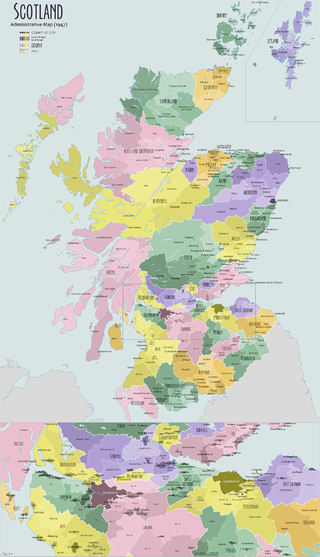The politics of Edinburgh are expressed in the deliberations and decisions of the City of Edinburgh Council, in elections to the council, the Scottish Parliament and the UK Parliament.

Glasgow City Council is the local government authority for Glasgow City council area, Scotland. In its modern form it was created in 1996. Glasgow was formerly governed by a corporation, also known as the town council, from the granting of its first burgh charter in the 1170s until 1975. From 1975 until 1996 the city was governed by City of Glasgow District Council, a lower-tier authority within the Strathclyde region.

The first elections to the new local authorities established by the Local Government Act 1972 in England and Wales and the new Northern Ireland district councils created by the Local Government Act 1972 took place in 1973. Elections to the existing Greater London Council also took place.
The 2008 Glasgow East by-election was a by-election for the UK Parliamentary constituency of Glasgow East which was held on 24 July 2008. The election was triggered when, on 30 June 2008, the sitting MP David Marshall stood down due to ill health.
An election for the Borough Council in Slough, England, was held on 6 May 2010. This was the 124th Slough general local authority election since Slough became a local government unit in 1863.
The politics of Glasgow, Scotland's largest city by population, are expressed in the deliberations and decisions of Glasgow City Council, in elections to the council, the Scottish Parliament and the UK Parliament.

An Election to the Edinburgh Corporation was held on 3 November 1936, alongside municipal elections across Scotland. The election took place amidst an increasingly sectarian political climate, with hardline Protestant and anti-Catholic political parties being on the rise in Glasgow and Edinburgh in the 1930s. The Protestant Action Society (PAS); Edinburgh's far-right Protestant grouping which had inspired a sectarian riot the previous year, won 31% of the vote and got 5 new members elected. The PAS had won 24% in the previous years election.

An Election to the Edinburgh Corporation was held on 7 May 1968, alongside municipal elections across Scotland. Of the councils 69 seats, 22 were up for election. Despite receiving the most votes of any single party, the SNP won only 7 seats. Unlike in Glasgow, the Progressives and Conservatives did not run on a joint ticket. Despite that however the parties only ran competing candidates in the Gorgie-Dalry ward.

An Election to the Edinburgh Corporation was held on 6 May 1969, alongside municipal elections across Scotland. Of the councils 69 seats, 23 were up for election.

An Election to the Edinburgh Corporation was held on 2 May 1972, alongside municipal elections across Scotland. Of the councils 69 seats, 23 were up for election.

An Election to the Edinburgh Corporation was held on 1 May 1973, alongside municipal elections across Scotland. Of the councils 69 seats, 26 were up for election. Labour, despite needing only 1 gain to take control of the council, failed to do so, preventing them from a historic win.

Local elections were held in Scotland in May 1973, as part of that year's wider British local elections. The elections were the last to the local authorities created under the Local Government (Scotland) Act 1929, and were replaced in 1975 by a uniform system of regions and districts.
An Election to Glasgow City Council was held on 6 May 1969, alongside municipal elections across Scotland. Of the councils 111 seats, 37 were up for election. The election saw Labour losing its majority, with the council being gained by a Progressive-Conservative alliance, who emerged from the election with a total of 57 of the council's 111 seats.
An election to the Dundee Corporation was held on 1 May 1973, alongside 1312 municipal elections across Scotland. 13 of the corporation's 36 seats were up for election.

Elections to the Corporation of the City of Glasgow were held on Tuesday 3 November 1896, alongside municipal elections across Scotland, and the wider British local elections.

Elections to Edinburgh Corporation were held on 3 May 1960, alongside municipal elections across Scotland. Of the councils 69 seats, 24 were up for election, including two seats in Murrayfield-Cramond ward. However only 15 wards in 14 seats were contested, as councillors were returned unopposed in nine wards.

Elections to Edinburgh Corporation were held on 2 May 1961, alongside municipal elections across Scotland. Of the councils 69 seats, 23 were up for election. However, only 16 seats were contested, as councillors were returned unopposed in seven wards.

An election to the Aberdeen Corporation was held on 1 May 1973, alongside municipal elections across Scotland. 12 of the corporation's 36 seats were up for election.

An election to the Aberdeen Corporation was held on 3 May 1949, alongside municipal elections across Scotland. 12 of the corporation's 37 seats were up for election.

An election to the Aberdeen Corporation was held on 1 May 1956, alongside municipal elections across Scotland. 12 of the corporation's 37 seats were up for election, although only 6 were contested.













